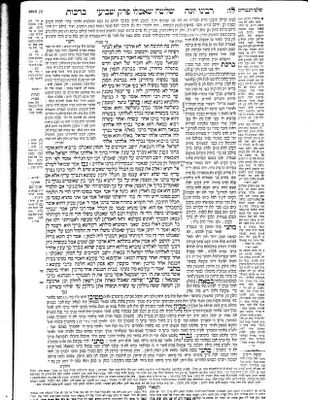
HIDE/SHOW IMAGE
36b
{Brachot 49a continues}
and there is no conclusion {to the blessing}, and if he does not recall {the he omitted mention of Rosh Chodesh} until he began HaTov VeHaMeitiv, he finished the blessing {and thus Birchat HaMazon} and does not need to return to the start, for Rav Nachman cited Shmuel: if he erred and did not mention Rosh Chodesh in prayer {=Shemoneh Esrei} we cause him to return; in Birchat HaMazon, we do not cause him to return.
What is the reason?
In prayer, that he cannot exempt himself from it, we cause him to return, but in Birchat HaMazon, that if he wants he is able to exempt himself from it {by not eating} we do not cause him to return.
"How much must he eat that we include him in the zimmun? An olive's measure. And Rabbi Yehuda says: until an egg's measure."
And the halacha is like the first Tanna {that is, an olive's measure}.
{Brachot 49b}
MISHNAH.
WHAT IS THE FORMULA FOR ZIMMUN?
IF THERE ARE THREE, HE [THE ONE SAYING GRACE] SAYS, Nevareich {'LET US BLESS [HIM OF WHOSE BOUNTY WE HAVE EATEN]'}.
IF THERE ARE THREE BESIDE HIMSELF HE SAYS, Barchu {'BLESS'.}
IF THERE ARE TEN, HE SAYS, 'Nevarech OUR GOD';
IF THERE ARE TEN BESIDE HIMSELF HE SAYS, Barchu.
IT IS THE SAME WHETHER THERE ARE TEN OR TEN MYRIADS.
IF THERE ARE A HUNDRED HE SAYS, 'Nevareich THE LORD OUR GOD';
IF THERE ARE A HUNDRED BESIDE HIMSELF HE SAYS, Barchu
IF THERE ARE A THOUSAND HE SAYS 'Nevareich THE LORD OUR GOD, THE GOD OF ISRAEL';
IF THERE ARE A THOUSAND BESIDE HIMSELF HE SAYS Barchu.
IF THERE ARE TEN THOUSAND HE SAYS, Nevareich 'THE LORD OUR GOD, THE GOD OF ISRAEL, THE GOD OF HOSTS, WHO DWELLS AMONG THE CHERUBIM, FOR THE FOOD WHICH WE HAVE EATEN'.
IF THERE ARE TEN THOUSAND BESIDE HIMSELF HE SAYS, Barchu.
CORRESPONDING TO HIS INVOCATION THE OTHERS RESPOND, 'Baruch THE LORD OUR GOD THE GOD OF ISRAEL, THE GOD OF HOSTS, WHO DWELLS AMONG THE CHERUBIM, FOR THE FOOD WHICH WE HAVE EATEN'.
R. JOSE THE GALILEAN SAYS: THE FORMULA OF INVOCATION CORRESPONDS TO THE NUMBER ASSEMBLED, AS IT SAYS in Tehillim 68:27:
| כז בְּמַקְהֵלוֹת, בָּרְכוּ אֱלֹהִים; אֲדֹנָי, מִמְּקוֹר יִשְׂרָאֵל. | 27 'Bless ye God in full assemblies, even the Lord, ye that are from the fountain of Israel.' |
Shmuel said: One should never exclude himself from the general body.
That is to say, that even if he has the ability {based on the number of people} to say Barchu, Nevareich is better, so as not to exclude himself from the general body.
{Brachot 50a}
And so is the conclusion, that Nevareich is better, but if he says Barchu, we do not seize him {find fault with him} on this.
And so we learn {in a brayta}: Whether he says Nevareich or Barchu, we do not seize him on this.
And from the blessing of a man, it is recognizable if he is a scholar or an ignorant one.
How so?
Rabbi Ami said: BeTuvo Chayinu {in His goodness we live} he is a scholar. MiTuvo Chayinu{from His goodness we live} he is a boor {=ignorant}.
Yerushalmi: Shmuel said: I do not remove myself from the general body.Rabbi Yochanan said: If he said Nevareich SheAchalnu MiShelo {Let us bless, that we have eaten of His}, he is a scholar. {Nevareich} to he {/He} SheAchalnu Mishelo {from whom we have eaten}, he is a boor, for it appears as if he is blessing some man from the world {that is, his host, as opposed to Hashem}.
They asked: Behold, one who reads from the Torah blesses Barchu.
Rabbi Avin said: Since he says HaMevorach {Who is blessed, he too is blessing Hashem, and thus} he does not remove himself from the general body.
And this that we say To He Who has done for our anscestors and for us all these miracles, miracles are different, for it is clear that it is Hashem who does for us miracles.
And Rabbi Yochanan said: Nevareich SheAchalnu MiShelo {Let us bless that we have eaten of His} he is a scholar. Al HaMazon SheAchalnu {upon the food that we have eaten} he is a boor, for it appears that he is blessing the food {as opposed to God}.
Rav Huna the son of Rav Yehoshua said: they only said this {the above statement where it looks like he is blessing the food as opposed to Hashem} with three, since he does not mention the Name of Heaven. However, with 10, since he needs to mention Leilokeinu {to our God} the matter is obvious {as to what he is directing the blessing at}.
For we have learnt {in the Mishna} "CORRESPONDING TO HIS INVOCATION THE OTHERS RESPOND, 'BLESSED BE THE LORD OUR GOD THE GOD OF ISRAEL, THE GOD OF HOSTS, WHO DWELLS AMONG THE CHERUBIM, FOR THE FOOD WHICH WE HAVE EATEN'." {Thus they say Al HaMazon SheAchalnu, and it is fine.}
{The Mishna had said:} "IT IS THE SAME WHETHER THERE ARE TEN OR TEN MYRIADS":
We establish that this statement is that of Rabbi Akiva, who said that that just as we find in the synagogue whether there are many or few.
And Rava rules that the halacha is in accordance with Rabbi Akiva.
MISHNA:
SAID R. AKIBA: WHAT DO WE FIND IN THE SYNAGOGUE?
WHETHER THERE ARE MANY OR FEW THE READER SAYS, {Barchu et Hashem} 'BLESS YE THE LORD.'
R. ISHMAEL SAYS: BLESS YE THE LORD WHO IS BLESSED. {Barchu et Hashem HaMevorach}
Gemara:
And the custom is like Rabbi Yishmael.
MISHNAH.
IF THREE PERSONS HAVE EATEN TOGETHER THEY MAY NOT SEPARATE [FOR GRACE].
SIMILARLY WITH FOUR AND SIMILARLY WITH FIVE.
SIX MAY DIVIDE, [AND HIGHER NUMBERS] UP TO TEN;
TEN {AND MORE} MAY NOT DIVIDE UNTIL THEY ARE TWENTY.



No comments:
Post a Comment